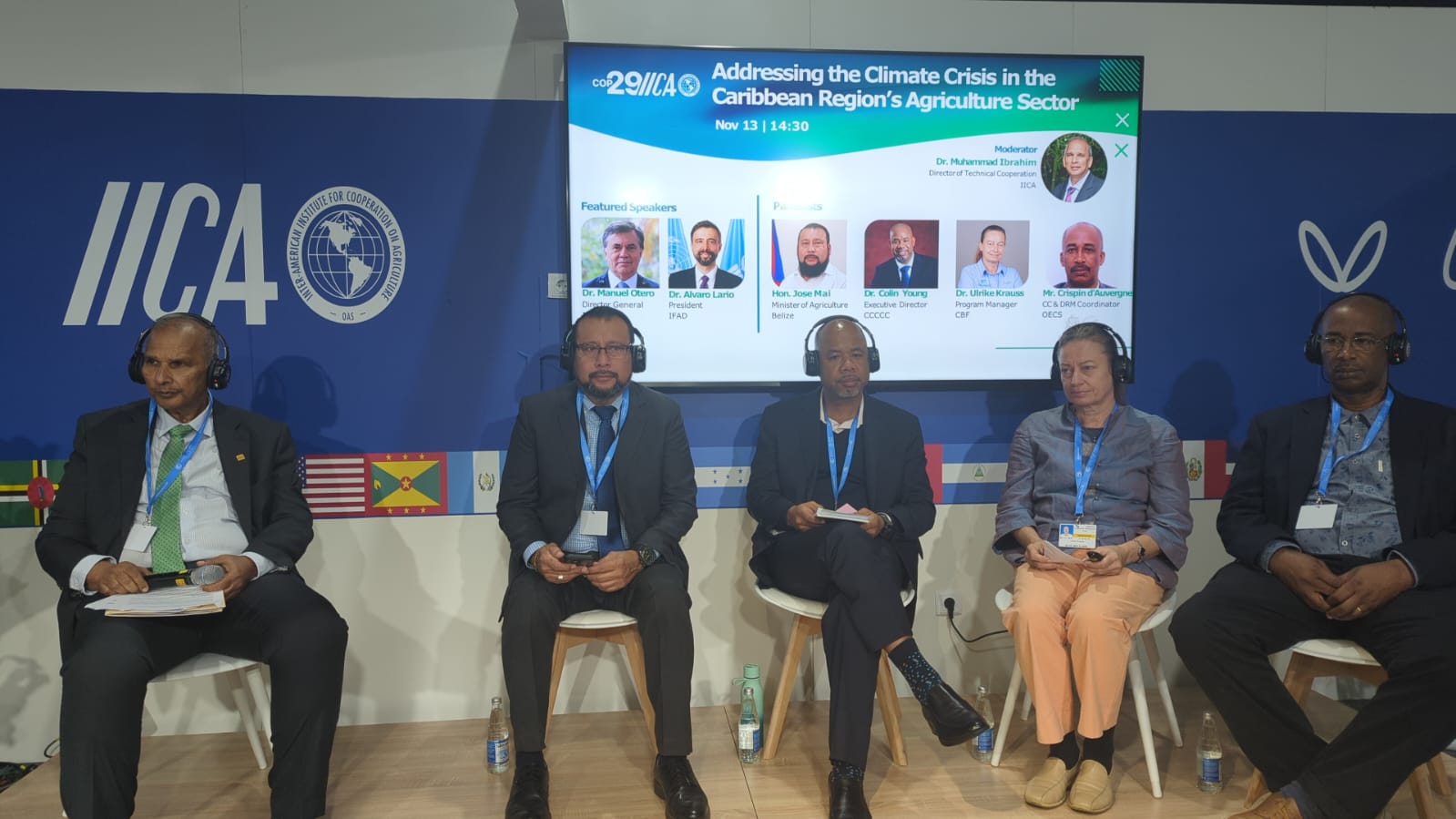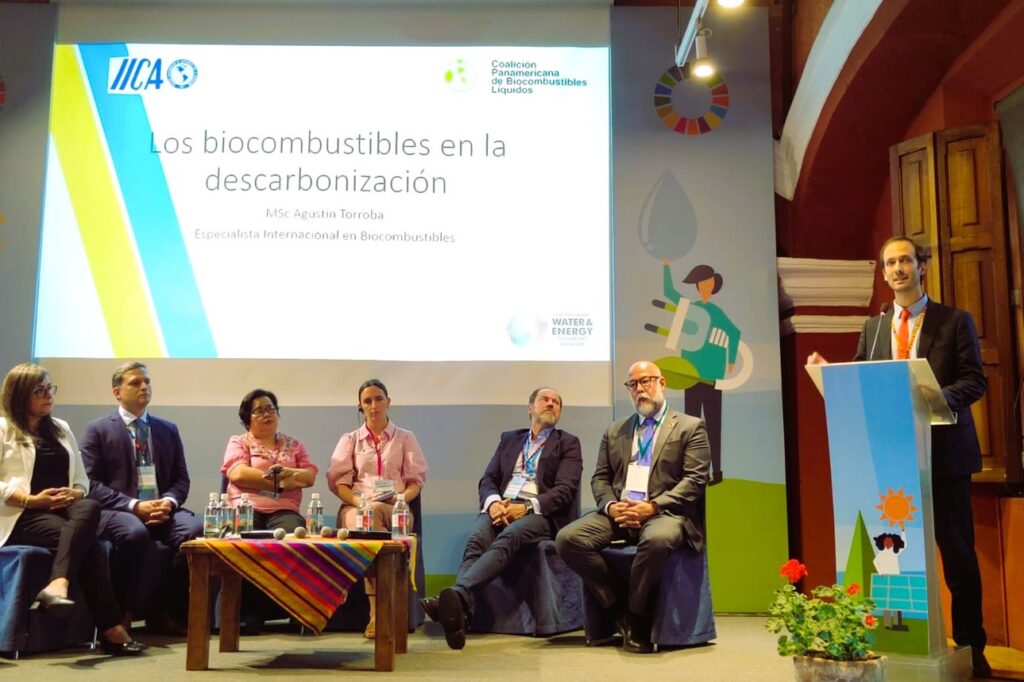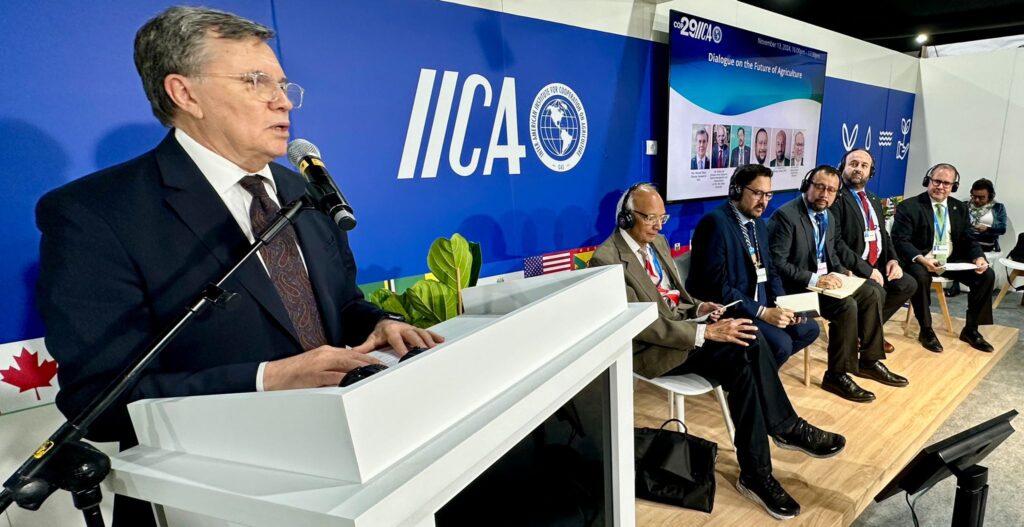The situation faced by farmers in Caribbean countries, whose livelihoods are under threat, was explained to COP29 participants in the pavilion operated by the Inter-American Institute for Cooperation on Agriculture (IICA) at the global event.

Baku, Azerbaijan, 25 November 2024 (IICA). Small island states in the Caribbean are among the most vulnerable in the world, and are working to build resilience in their agrifood systems, which are feeling the impact of increasingly frequent natural disasters.
The situation faced by farmers in Caribbean countries, whose livelihoods are under threat, was explained in detail to the participants in COP29 at the pavilion operated by the Inter-American Institute for Cooperation on Agriculture (IICA) at the global event.
Taking part in the activity were the Minister of Agriculture and Food Security of Belize, José Abelardo Mai; the Executive Director of the Caribbean Community Climate Change Center, Colin Young; and the Coordinator of Climate Change and Disaster Risk Management of the Organisation of Eastern Caribbean States (OECS), Crispin D’Auvergne.
Mai was one of two Caribbean agriculture ministers who attended the United Nations Climate Change Conference, along with Roland Royer of Dominica. Their presence at the Home of Sustainable Agriculture of the Americas, the name given to the pavilion of IICA and its partners in Baku, aroused a great deal of interest.
“In Belize,” Mai said, “we usually have two maize crops: one in June and one in November. Recently, farmers have learned that if they plant in June, the risks are greater, because the season coincides with the peak of hurricane season. So, they already know that it is better to plant in November, although the problem then is that the growing season becomes longer.”
Mai said that the partnership with IICA and other international agencies is key to securing financing, technical expertise, and support.
“Farmers are the key players in making changes happen and achieving results. Belize’s agriculture sector faces many challenges. This is especially true of small farmers, who are the majority in the country. Funding is often not forthcoming, but the needs are urgent,” he said.
The need to show results
Colin Young, whose has extensive experience in the relationship between agriculture and climate in the Caribbean, gave details of a project designed to improve the resilience of sugarcane producers in northern Belize, funded by the Global Environment Facility (GEF).
“We need to communicate and show evidence of the success of these projects, in order to expand good practices. It is essential to extend the use of good practices, and examples are essential for that. If you are building resilience in the agriculture sector, you are improving the living conditions of rural communities and that fact must be communicated,” he said.
“It is absolutely clear that we need partnerships and coalitions because we cannot tackle this situation alone. IICA operates in the Caribbean Community (CARICOM) countries, building capacities and providing new tools; it plays an essential role and we also have other entities that play an important role. But this assistance must function in an integrated manner to have greater impact,” he concluded.
D’Auvergne explained that the Organisation of Eastern Caribbean States (OECS) is made up of eleven countries, which are working to become resilient, even though climate change is evolving more quickly than previously supposed.
“Until recently, many people thought that this would be a problem for future generations, but that has not happened. Today, a hurricane is capable of completely destroying a country’s economy. This happened in Dominica in 2017, for example, and the island took several years to recover,” he said.
D’Auvergne said countries are doing all they can, but a lack of international funding is an obstacle.
“We must bear in mind,” he concluded, “that in many Caribbean countries climate change is not the only problem, but that there are other problems as well. Tourism brings in money, but it requires food, which often has to be imported. There is also a problem of productivity and an insufficient labor supply in rural areas, due to the migration of young people. If the objective is to build resilience, it is essential to attract young people to agriculture in the Caribbean.”
More information:
Institutional Communication Division.
comunicacion.institucional@iica.int










